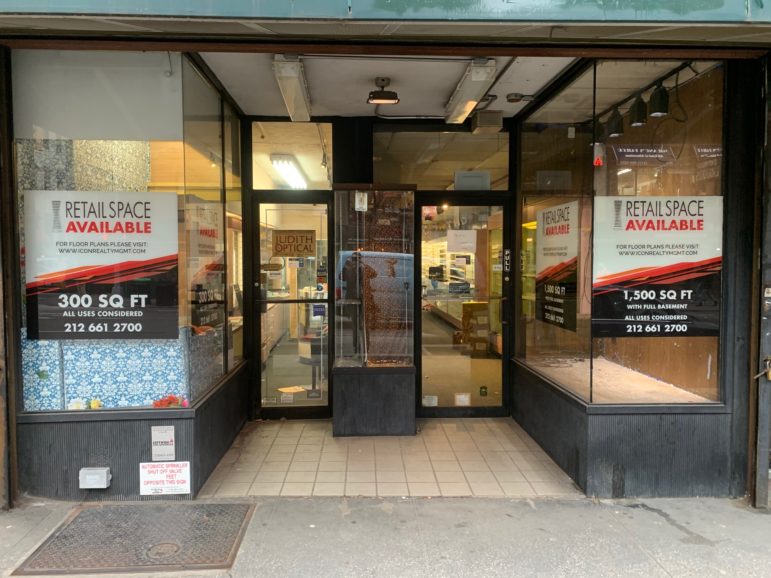
Cameron Koffman
An increasingly common scene on the UES?
Walk the typical block on Lexington Avenue and you’ll see a half-dozen vacant storefronts. Walk another few blocks in any direction and that number quickly grows. At last count, the Upper East Side retail vacancy rate is 1 in every 8 storefronts. Far too many. The great urban reformer, Jane Jacobs, argued that healthy sidewalks make for healthy communities, but our sidewalks are increasingly bare and our community has suffered. Along Madison and Lexington Avenues, store windows stand empty, while all throughout the Upper East Side small and local businesses continue to close their doors. In every corner of our neighborhood signs that once read “Open” now say “For Rent”. This district’s retail character, the driver of so much energy and life, is in decay.
And this retail character is not just about economic activity, it is about the fabric of our community. The Upper East Side is a place that draws the people of this city together from each borough and each walk of life. Just take a look into businesses like Neil’s Coffee Shop and you can see a cross-section of the city sipping coffee, ordering bagels, and engaging in lively debate. However, local businesses like these continue to suffocate in an atmosphere which has driven away entrepreneurs, jobs, and opportunity from the community.
And, of course, the Upper East Side is not just a shopping destination, it is an iconic residential neighborhood that over 200,000 New Yorkers call home. But looming projects further threaten the vibrancy of our sidewalks and the character of our community. Northwell’s plans for expansion of the Lenox Hill Hospital will result in 10 years of construction for which the neighborhood has not asked and does not need. The project’s proposed 490-foot and 520-foot tall buildings would join other skyscraper proposals throughout the district which both endanger the health of our community and provide little tangible benefit to the area. This is not to say the Upper East Side should spurn any attempts at development; we do need development, but we must demand that it serves the needs of our community and draws people to the area. Luxury condos proposed by Northwell will only become fodder for New York City’s unsustainable real estate bubble while the sheer size of other tower projects runs roughshod over the architectural history of the neighborhood.
The Upper East Side is known and valued for its character but this essential fact has been forgotten by our elected leaders. We have awaited action to address the problems tearing at the very fabric of our community, but have so far only seen the problems worsen. We cannot continue to wait. We need policies that aid entrepreneurs in filling vacant storefronts. We must re-examine the commercial rent tax, reform our property tax system, and clean up the backlogs at the State Liquor Authority. Instead of luxury condos, we need housing that is within the reach of New Yorkers who want to make the Upper East Side their home.
More than anything, we need local leadership with first-hand knowledge of how suffocating retail business and unchecked overdevelopment starves our neighborhoods of the vibrant sense of community that has made the Upper East Side an excellent place to visit, live, or raise a family. The Upper East Side is full of New Yorkers who take pride in their neighborhood and deserve to have a say in its future; as our sidewalks empty and the health of our community suffers, the need for immediate action only grows.
Cameron Koffman is a Democrat running for New York State Assembly in the 73rd District.









One thought on “Opinion: What’s Happening to Retail on the Upper East Side?”
Business owners and landlords are indeed being suffocated. NYC regulations are completely out of control. In addition to the hundreds of complex rules landlords needs to comply with, the City recently passed “reform” for rental apartments which will have an avalanche of negative effects. As difficult as it was to own property prior to the new laws being passed, it is exponentially more difficult now. Inviolate private property rights have been eviscerated by these new laws taken away the profit motive central to our system of capitalism. It is capitalism that has made this country the richest and most successful country in the world. With rent increases on rent stabilized apartments being capped, landlords have no incentive to make the individual apartment improvements that were once central to improving the NYC housing stock. Previously busy contractors who were previously busy putting in new kitchens and bathrooms are now wondering why they are no longer being given this type of work. All this has a trickle down effect. Real Estate Taxes for small buildings are also out of control. NYC legislators should worry about landlords walking away from their buildings again and rethink the change they have made and perhaps we can start there.